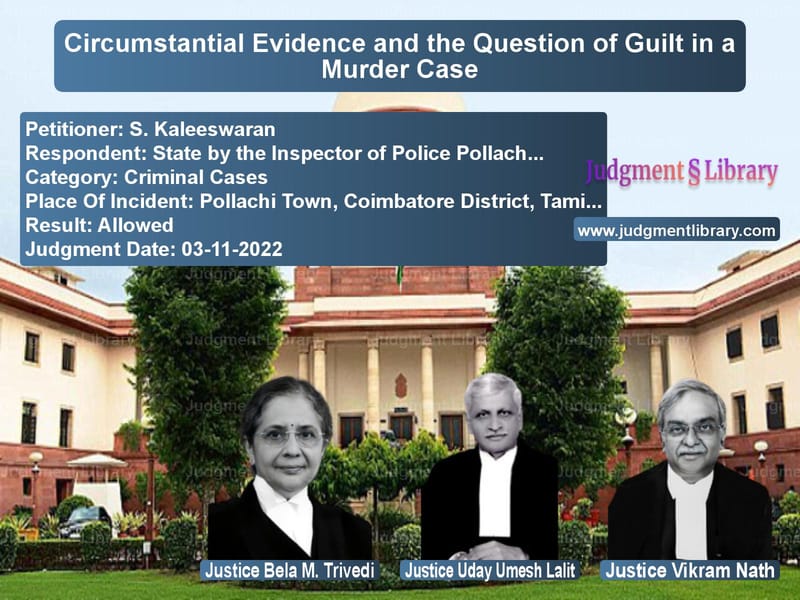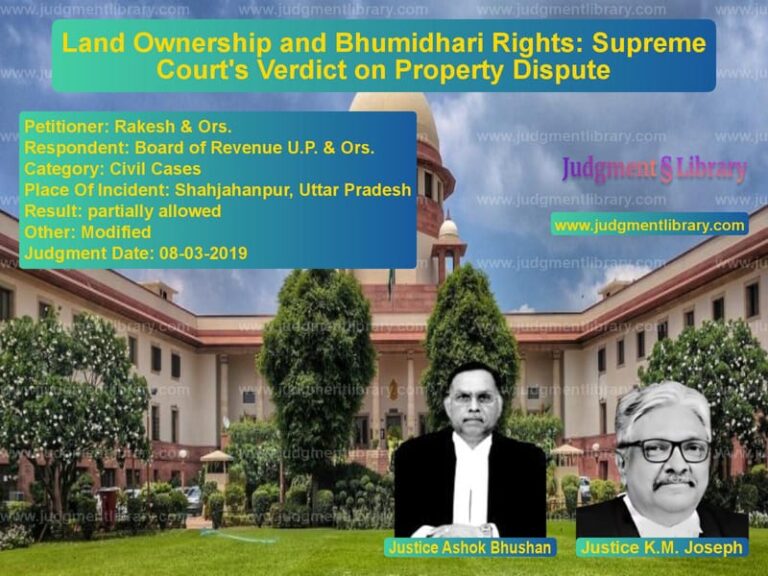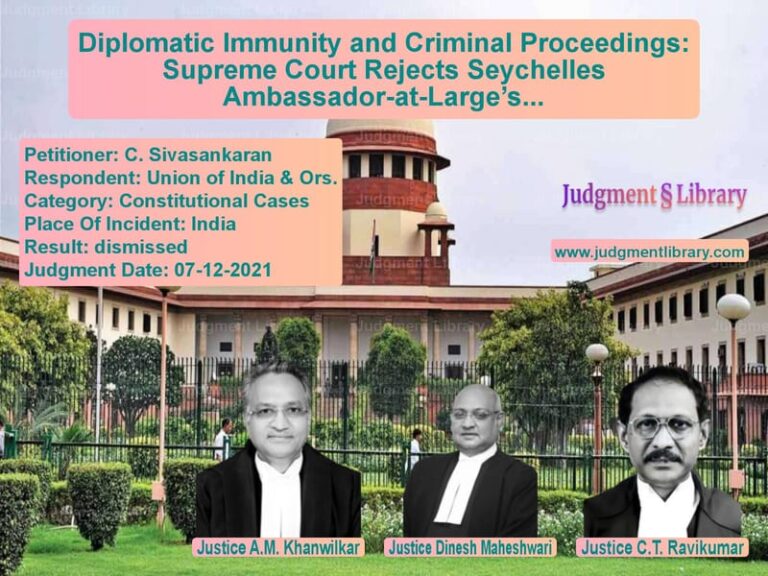Circumstantial Evidence and the Question of Guilt in a Murder Case
The case at hand revolves around the conviction of five individuals, including S. Kaleeswaran and John Anthonisamy, for the murder of John Thomas, a taxi driver. The case is based primarily on circumstantial evidence, and the appellants have appealed against their conviction. The appellants were convicted for a series of offenses, including murder (Section 302), kidnapping (Section 364), criminal conspiracy (Section 120B), and dacoity (Section 396), with sentences ranging from rigorous imprisonment to life imprisonment. The appellants have contested their convictions, arguing that the prosecution failed to establish the chain of circumstances leading to their guilt beyond a reasonable doubt.
Factual Background
The facts of the case reveal that the appellants, along with three other accused individuals, conspired to commit dacoity and murder. On July 18, 2007, John Thomas, the driver of an Ambassador car, was hired by the first appellant, John Anthonisamy, under the pretense of going to Udumalpet. The car was later stopped in an isolated location, where the victim was murdered by the accused. The accused then buried the body of John Thomas and sold the car to a third party in an attempt to cover up the crime. The body was discovered several months later, and an investigation led to the arrest of the accused based on circumstantial evidence.
Following the discovery of the body, the wife of the deceased filed a missing person report, and the investigation began. The prosecution presented evidence, including the testimony of witnesses who claimed to have seen the victim with the accused before his disappearance. The prosecution also relied on an extra-judicial confession allegedly made by the first appellant, which was used to corroborate the other evidence presented.
The Legal Arguments
The appellants’ legal team argued that the entire case rested on circumstantial evidence, which they claimed was not sufficient to prove guilt beyond a reasonable doubt. They contended that the extra-judicial confession was unreliable as it was not corroborated by a handwriting expert and could not be the sole basis for conviction. Furthermore, they argued that the prosecution’s reliance on the “last seen together” theory was flawed, as the testimonies of the witnesses were recorded several months after the incident, casting doubt on their reliability. The appellants also raised concerns about the identification of the deceased, which was based on a superimposition test, a method that they argued was unreliable without additional corroborative evidence.
On the other hand, the respondent (the State) argued that the circumstantial evidence, when considered as a whole, established the guilt of the accused. The respondent contended that the chain of evidence was complete, with the recovery of the deceased’s car and other incriminating evidence linking the appellants to the crime. The respondent further pointed out that while the extra-judicial confession was not admitted as evidence, the other circumstantial evidence sufficiently proved the accused’s involvement in the crime.
The Court’s Consideration
The Court, in its judgment, carefully examined the circumstantial evidence presented by the prosecution. It referred to the five golden principles established by this Court in previous cases, particularly the case of Sharad Birdhichand Sarda v. State of Maharashtra, which outlines the requirements for convicting an accused based on circumstantial evidence. These principles include the necessity of proving the circumstances beyond a reasonable doubt, ensuring that the facts are consistent only with the hypothesis of the guilt of the accused, and excluding every possible hypothesis except for the one to be proved.
The Court specifically addressed the issue of the “last seen together” theory, which was a key piece of evidence for the prosecution. However, it pointed out that the witnesses who testified to seeing the deceased with the accused had given their statements months after the incident, and their credibility was questionable. The Court also noted that the failure of the accused to explain the circumstances surrounding the victim’s death did not necessarily establish their guilt, as this failure could not be considered in isolation from the entire chain of circumstances.
The Court also discussed the superimposition test used to identify the deceased, emphasizing that while such tests are admissible, they should not be relied upon as the sole piece of evidence in criminal cases. The Court agreed with the appellants’ contention that the identification of the deceased through the superimposition test was not sufficiently corroborated by other reliable evidence, such as a DNA test or a post-mortem report.
The Court’s Judgment
In its final analysis, the Court concluded that the prosecution had failed to establish the chain of circumstantial evidence beyond a reasonable doubt. The Court pointed out that the key evidence, such as the extra-judicial confession and the identification of the deceased, was unreliable and lacked sufficient corroboration. The Court also noted that the prosecution had failed to prove the motive for the crime, which is a crucial element in circumstantial evidence cases. The lack of motive, combined with the inconsistencies in the testimony of the witnesses, led the Court to doubt the prosecution’s case.
As a result, the Court set aside the convictions of the appellants and directed that they be acquitted. The judgment emphasized the importance of ensuring that the prosecution proves its case beyond a reasonable doubt, particularly in cases based on circumstantial evidence. The Court also reiterated the principle that the failure of the accused to explain the circumstances of the crime does not automatically lead to a conviction, especially when the prosecution’s evidence is weak and inconclusive.
Conclusion
This judgment underscores the significance of presenting a strong and coherent case when relying on circumstantial evidence. It highlights the need for corroborative evidence, particularly when the prosecution relies on theories like “last seen together” and methods like superimposition tests. The Court’s decision to acquit the appellants serves as a reminder that in criminal cases, the burden of proof lies with the prosecution, and it must establish the guilt of the accused beyond a reasonable doubt. The judgment also reaffirms the principle that the failure to explain the circumstances of a crime does not automatically result in a conviction unless the prosecution has proved its case beyond any doubt.
Petitioner Name: S. Kaleeswaran.Respondent Name: State by the Inspector of Police Pollachi Town East Police Station.Judgment By: Justice Bela M. Trivedi, Justice Uday Umesh Lalit, Justice Vikram Nath.Place Of Incident: Pollachi Town, Coimbatore District, Tamil Nadu.Judgment Date: 03-11-2022.
Don’t miss out on the full details! Download the complete judgment in PDF format below and gain valuable insights instantly!
Download Judgment: s.-kaleeswaran-vs-state-by-the-inspect-supreme-court-of-india-judgment-dated-03-11-2022.pdf
Directly Download Judgment: Directly download this Judgment
See all petitions in Murder Cases
See all petitions in Fraud and Forgery
See all petitions in Theft and Robbery Cases
See all petitions in Judgment by Bela M. Trivedi
See all petitions in Judgment by Uday Umesh Lalit
See all petitions in Judgment by Vikram Nath
See all petitions in allowed
See all petitions in supreme court of India judgments November 2022
See all petitions in 2022 judgments
See all posts in Criminal Cases Category
See all allowed petitions in Criminal Cases Category
See all Dismissed petitions in Criminal Cases Category
See all partially allowed petitions in Criminal Cases Category







